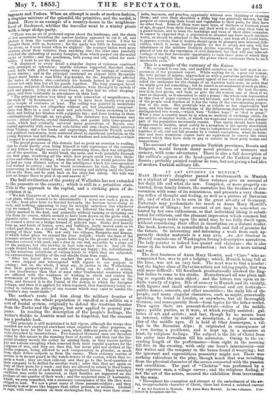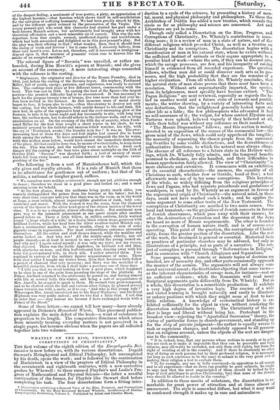AN ART STUDENT IN MUNICH. * MARY Howrrr's daughter passed a
twelvemonth in Munich as a student of painting ; and these volumes give an account of her daily life and what she saw. Compiled, or more properly ex- tracted, from family letters, the narrative has the freshness of con- versation with some of its minuteness, and presents a very charm- ing reflex of thought and feeling, as well as a picture of Bavarian life, and of what is to be seen in the great art-city of Germany. Externals may predominate too much in Anna Mary Howitt's description of things; • her account of art may be somewhat co- loured by her own enthusiasm, so that individual liking is substi- tuted for criticism, and the pleasant impression which common but present images make upon the mind may be too fully dwelt upon, without considering their effect in description on a distant reader. The book, however, is remarkable in itself, and full of promise for the future. So interesting and informing a work from such ap- parently slender materials is a rare avis. An Art Student to Munich reminds one of Washington Irving's descriptive narratives. The lady-painter is indeed less quaint and elaborate ; she is also looser in the texture of her production ; but she is more natural and real.
The first business of Anna Mary Howitt, and " Clare " who ao- companied her, was to get a lodging ; which, Munich being full at the time, was not an easy task. The next was to find a master : but the higher class of Bavarian artists not taking pupils, that was still more difficult ; till Kaulbach goodnaturedly allowed the hag- fish ladies to come to his studio. Henceforward all was plain sail- ing as regards the main object ; and the letters run upon an in- finite variety of topics. Bits of scenery in Munich and its vicinity, with figures and small adventures—national and art festivals—
public dances, concerts, and other assemblies ; the daily life of the people, and many singular characters, such as might, generically speaking, be found in London, or anywhere, but all thoroughly German, and consequently fresh—form topics for the letter-writer. Then again there are peasant-festivals—relics of the middle ages; public parties, as it were, at which royalty assisted; gal- leries of art and artists ; and last, though by no means least in interest, either in reality or description, a regular miracle- play of the middle ages. It is held at Ober Ammergau, a vil- lage in the Bavarian Alps ; it originated in consequence of a vow during a pestilence, and is kept up, in a measure at least, by religious feelings. The subject is the life of Christ from his entry into Jerusalem till his ascension. Owing to the ex- ceeding length of the performance—from eight in the morning till five in the evening, with only one hour's intermission—our fair writer and the company in the boxes found it wearying; but the ignorant and superstitious peasantry might not. There was nothing ridiculous in the play, though much that was revolting from the physical character of the scenes connected with the passion and crucifixion. The part of " Christus " was performed by a very superior man, a village carver ; and the religious feeling, if not the art of the actors, secured the exhibition from irreverence in the main.
" Throughout his conception and attempt at the embodiment of the aw- ful, unapproachable character of Christ, there had flowed a subdued current • An Art Student in Munich. By Anna Mary Hewitt. lu two volumes. Pub- lished by Longman and Co. of the deepest feeling, a sentiment of true poetry, a piety, an appreciation of the highest heroism,—that heroism which shows itself in self-annihilation for the salvation of suffering humanity. We had been greatly struck by this, and by the different spirit evinced in the personation of the Virgin. The young peasant-girl who acted this character had studied her part under a well-known Munich actress, but unfortunately had brought away with her theatrical affectation and a most miserable air of conceit. This was the sole departure from that simple, earnest, unaffected dignity and truthfulness, which had both astonished and delighted us in this poor peasant's play. But the play was their offering to God ! what wonder, then, that it should bear the stamp of truth and fervour ? for it came forth, I sincerely believe, from their very heart's core. Let us not, therefore, call it irreverent or irreligious: depend upon it, that murmur of peasants' voices rose to heaven like the smoke of an accepted sacrifice."
The colossal figure of "Bavaria" was unveiled, or rather =- boarded, during Miss Howitt's sojourn at Munich; and she gives an account of the ceremony. A more interesting stage connected with the colossus is the casting.
" Stiglmaver, the originator and director of the Bronze Foundry, died in 1844, just before the casting of the Bavaria began. His nephew, Ferdinand Miller, full of youth, energy, patience, and experience, was ready to succeed him. The castings took place at five different times, commencing with the head. This was cast in 1844. In casting the bust of the figure—the largest portion—the greatest difficulty had to be encountered. It was necessary to melt for the purpose twenty tons of bronze, five tons more than had ever-be- fore been melted in the furnace. As this immense mass of metal slowly began to fuse, it began also to cake,—thus threatening to destroy not only the casting, but the whole furnace, with untold danger to life and limb. Six men had, in spite of the oppressive heat and the ever-increasing glow of the furnace, to take it by turns night and day incessantly to stir, with long iron bars, the molten mass, lest it should adhere to the furnace-walls, and so bring annihilation on all. On the evening of the fifth day of anxiety, when Ferdi- nand Miller for the first time sought a short repose in his chair, he was suddenly aroused by his faithful and anxious fellow watcher, his wife, with the cry of 'Ferdinand, awake ! the foundry is on fire !' It was so. The ever- increasing heat of those five days and four nights had caused fire to burst forth among the rafters. To have attempted to extinguish the fire by water, with this molten mass below, would have caused the immediate destruction of the place. AU that could be done was, by means of wetted cloths, to keep down the tire. This was tried, and the melting went on as before. Amid such danger did the casting of the bust take place about midnight on the 11th of October 1845. Success!' was shouted forth ; a load of anxiety of many kinds fell from every breast ; and all then hastened to the complete extin- guishing of the fire."
The following is from a sort of Mansionhouse ball, which the city gives and royalty attends. It is a rule of Munich that there is no admittance for gentlemen out of uniform; but that of the militia, a national or burgher guard, suffices.
" We ourselves were neither aristocratic enough nor yet plebeian enough to dance ; therefore we stood in a good place and looked on ; and a most amusing scene we beheld. " At the first glance, from the uniforms being pretty much alike, you scarcely distinguished the prince from his butcher or his baker; but in a very short time your eye told you that there was in the room, as in the world at large, a moat subtile, almost imperceptible gradation of rank, both con- ventional and moral. With the women it was the same, from the diamond crown of the Queen to the silver head-gear of the citizen maiden of the lower class. It was to Inc a singular, almost affecting study. But sentiment soon gave way to the intensest amusement as one queer couple after another passed before us. There a little fellow, in militia uniform, fairly waltzed round ' a huge whale of a wife,' in a heavy black cotton dress, gorgeous with brilliant flowers, while her head bore the silver swallow-tailed Munich cap ; here a sentimental maiden, in tawny muslin, dung to the arm of some gigantic crane in regimentals. The most extraordinary costumes presented themselves. All the cotton and stuff dresses danced, while the muslin and satins looked on. And why not? All the middle-aged, elderly, nay old people danced,—so at least it seemed to me,—whilst the young looked on. And why not ? I again asked myself • it was only my taste, not my reason, that objected. There was the feeble Appleshoe, in brilliant red and blue, with spectacles on nose, and thin buff-coloured hair, dancing away with his bony but good-natured wife, in black silk. I rather admired them. I re- cognized in various of the military figures acquaintances of mine. There from that soldier I bought my winter dress, from that ferocious little fellow a packet of charcoal that very morning ; and there was the modeller of a beautiful statuette, from whom I shall make a purchase one of these days. " I told you that we stood looking on from a good place, which happened to be close to one of the grim lions guarding the steps of the platform. As Prince Adelbert returned to the aristocracy he passed us, and having danced with Ida at several balls this winter, and being a sort of acquaintance of Mrs. Amsel's, he stopped to speak to them. He seemed very good-tempered, and as he chatted about the ball and various other things, he glanced several times towards me with a smile, as if to say 'And who is this young lady ?' Whereupon Mrs. Amsel introduced me to his Royal Highness ; and his Royal Highness was very polite indeed ; and we two had a little chat. I tell this in order that — may honour use because I have exchanged words with a Prince of the Blood."
Some of these letters—we cannot tell how many—have already appeared in Dickens's Household Words. This piecemeal publica- tion explains the main defect of the book—a want of substance in proportion to its length. The comparative flimsiness which arises from minutely treating everyday matters is not perceived in a single paper, but becomes obvious when the papers are all collected together into two volumes.



























 Previous page
Previous page